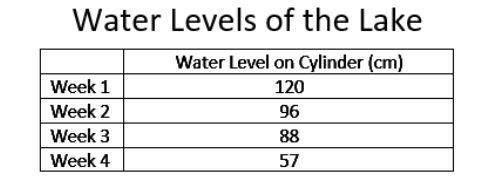
Biology, 01.04.2021 21:10 changav36832
1. In science class, Eric learns about relationships between organisms in nature. The concepts of predation and parasitism tend to confuse him. Which explains the difference between these two concepts?
1Parasitism results in two organisms benefiting while in predation only one organism benefits.
2Parasitism happens quickly, but predation happens over time.
3Predation results in the death of one organism while in parasitism the host may only be harmed.
4 Predation and parasitism are the same thing, since only one organism is harmed in each relationship.
2. Ryan lives in a house near a small lake. In the past few months, he has noticed that there has been very little rainfall due to a drought. He monitored the water depth in the lake by inserting a metal cylinder in the sand and marking the water level each week for 4 weeks. He recorded his data in the table below. What would MOST LIKELY take place in the lake ecosystem based on this data? *
1The fish population would decrease due to competition for food and shelter
2The deer population would increase due to increased space for habitats
3Trees near the water’s edge will grow twice as fast during the drought
4Fish-eating birds would find it more difficult to catch their prey in the lake
Sharks are the top predator in a marine ecosystem. By consuming smaller organisms, sharks maintain a balance in the population. If the shark population were to decrease, the smaller organisms would increase, interrupting the food web. Which of the following relationships is MOST similar to the relationship described? *
1A frog eats flies and lizards in a swamp ecosystem
2Leaf-cutter ants eat grass in a prairie ecosystem
3A wolf eats small mammals in a forest ecosystem
4An owl eats mice and insects in a forest ecosystem
(the picture is at the bottom of the question)


Answers: 1
Another question on Biology

Biology, 21.06.2019 17:00
In tossing one coin 10 times, what are your chances for tossing a head? a tail? 2. in tossing one coin 100 times, what are your chances for tossing a head? a tail? 3. in tossing one coin 200 times, what are your chances for tossing a head? a tail? deviation = ((absolute value of the difference between expected heads and observed heads) + (absolute value of the difference between expected tails and observed tails)) divided by total number of tosses. this value should always be positive. 4. what is the deviation for 10 tosses? 5. what is the deviation for the 100 tosses? 6. what is the deviation for 200 tosses? 7. how does increasing the total number of coin tosses from 10 to 100 affect the deviation? 8. how does increasing the total number of tosses from 100 to 200 affect the deviation? 9. what two important probability principles were established in this exercise? 10. the percent of occurrence is the obtained results divided by the total tosses and multiplied by 100%. toss the coins 100 times and record your results. calculate the percent occurrence for each combination. percent head-head occurrence: percent tail-tail occurrence: percent head-tail occurrence:
Answers: 1

Biology, 22.06.2019 07:00
According to the cell theory, which describes cells? a. all organisms are composed of multiple cells. b. all cells have the same structure and function. c. cells are found in everything on earth. d. living organisms are not created spontaneously
Answers: 2

Biology, 22.06.2019 12:30
Which term most precisely describes the cellular process of breaking down large molecules into smaller ones? a) catalysis b) metabolism c) anabolism d) dehydration e) catabolism
Answers: 1

Biology, 22.06.2019 19:30
Explain the physiological changes that occur when the hypothalamus stimulates the sympathetic nervous system. you can make a flowchart or a simple step process. be sure to include all chemicals/hormones secreted, glands involved and the functions of each chemical/hormone.
Answers: 2
You know the right answer?
1. In science class, Eric learns about relationships between organisms in nature. The concepts of pr...
Questions





Biology, 02.12.2019 22:31

History, 02.12.2019 22:31



Physics, 02.12.2019 22:31

Mathematics, 02.12.2019 22:31

Mathematics, 02.12.2019 22:31

Mathematics, 02.12.2019 22:31

Mathematics, 02.12.2019 22:31

Mathematics, 02.12.2019 22:31

Chemistry, 02.12.2019 22:31

History, 02.12.2019 22:31

Mathematics, 02.12.2019 22:31


Mathematics, 02.12.2019 22:31

History, 02.12.2019 22:31



